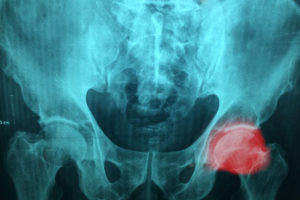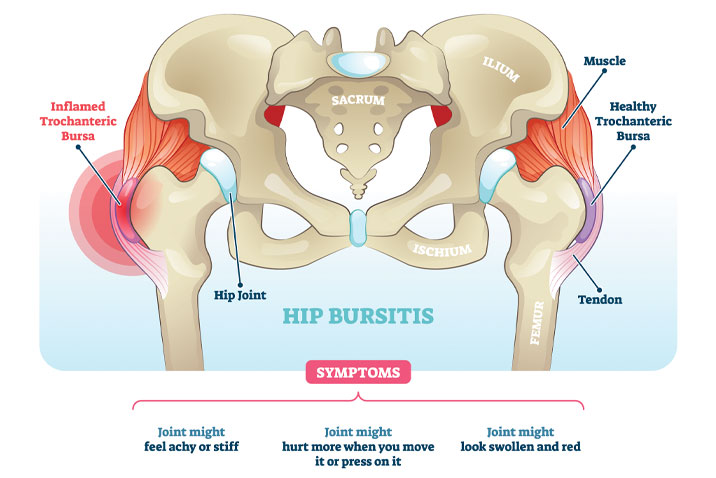 What is trochanteric bursitis? It is a common type of chronic hip pain. Trochanteric bursitis may affect the hip’s outer area, or the outside part of the upper leg, from the hip to the knee along the thigh. Symptoms include pain on the outside of the hip that’s worse with activities such as standing, walking, or running. It is the inflammation of the bursa (fluid-filled sac near a joint) at the part of the hip called the greater trochanter. The inflammation of this bursa causes pain in the hip.
What is trochanteric bursitis? It is a common type of chronic hip pain. Trochanteric bursitis may affect the hip’s outer area, or the outside part of the upper leg, from the hip to the knee along the thigh. Symptoms include pain on the outside of the hip that’s worse with activities such as standing, walking, or running. It is the inflammation of the bursa (fluid-filled sac near a joint) at the part of the hip called the greater trochanter. The inflammation of this bursa causes pain in the hip.
The Causes
Trochanteric bursitis can be the result of several events:
- Hip injury or trauma
- Falling on the outside of the hip or banging the hip on any hard surface, can cause the bursa to fill with blood and/or its lining to become inflamed
- Repetitive pressure or friction
- Certain medical conditions
- Excess weight
- Bone spurs or calcium deposits on the hip bone
- Incorrect posture
Bursitis is more common for the elderly and women. In many cases the cause is unknown.
The Symptoms
Trochanteric Bursitis can cause the following symptoms:
- You have sharp pain right at the hip bone that may extend down the outside (lateral) of your thigh.
- You have pain that is worse at night when you lie down.
- You have pain while walking that may cause you to limp.
- You have pain during activities such as getting up from a deep chair or getting out of a car.
- You have swelling and tenderness in the area of the bursa.
The Treatment
Hip bursitis will often get better on its own as long as it is not caused by an infection. To heal your hip bursitis, you will need to rest the affected joint and protect it from any further harm. Most patients feel better within a few weeks with proper treatment.
If, in a few weeks, the pain is persistent, more advanced treatment options include:
- Nonsteroidal anti-inflammatory drugs, such as ibuprofen or naproxen
- Corticosteroid injections are given by your healthcare provider.
- Physical therapy includes range of motion exercises and splinting.
- Surgery, when other treatments are not effective.
The Prevention
Trochanteric bursitis is best prevented by warming up properly and stretching the muscles on the outer side of your upper thigh. You can begin stretching the muscles that run along the outside of your hip by doing strengthening exercises.
Exercises
- Knee lifts stretch your hip flexors, thigh muscles, and gluteal muscles.
- Leg raises build strength in your hip muscles.
- Butterfly pose
- Seated marching
- Hip circles
- Eat whole grains, fruits, vegetables, and fatty fish to help reduce inflammation. Avoid processed foods and foods high in sugar and fat.
- Lose weight if needed.
- If one foot is shorter, get a shoe insert.
- Try glucosamine or omega-3 fatty acids.
- Use a cane for a week or more, when needed.
Medical Advice
When should you get medical advice? See your healthcare provider if you have any of the following signs or symptoms:
- The pain is interfering with your normal day’s activity
- The soreness is not improving after all the self-care measures were taken
- The pain comes and goes; you feel better but the bursitis returns
- The area appears red, swollen, and you have a fever
- If you have an autoimmune issue because of health conditions or medications
If septic bursitis is left untreated, the fluid inside the bursa can turn to pus. In addition, the infection can spread to the bloodstream and other parts of the body. If the infection spreads, symptoms will become worse, and the infection can even become life-threatening.
Contact Us (859-331-3100) For More Information or to Request an Appointment
 About Tristate Arthritis and Rheumatology
About Tristate Arthritis and Rheumatology
Tristate Arthritis and Rheumatology is the first and largest Rheumatology practice in the Northern Kentucky area. Founded by Dr. Arthur Kunath in 1986, our rheumatology practice now consists of six doctors who are board certified in both Internal Medicine and Rheumatology and a Physician Assistant. Patients see one doctor (except in emergencies), thereby assuring continuity of care and an individualized doctor-patient atmosphere giving the physician the ability to establish personalized and detailed relationships. Our doctors have received numerous awards, including being listed as “Top Doctors” in Cincinnati Magazine, receiving the Patient’s Choice Award, the Most Compassionate Doctor Award, and the American College of Rheumatology’s “My Doc Rocks” award.



